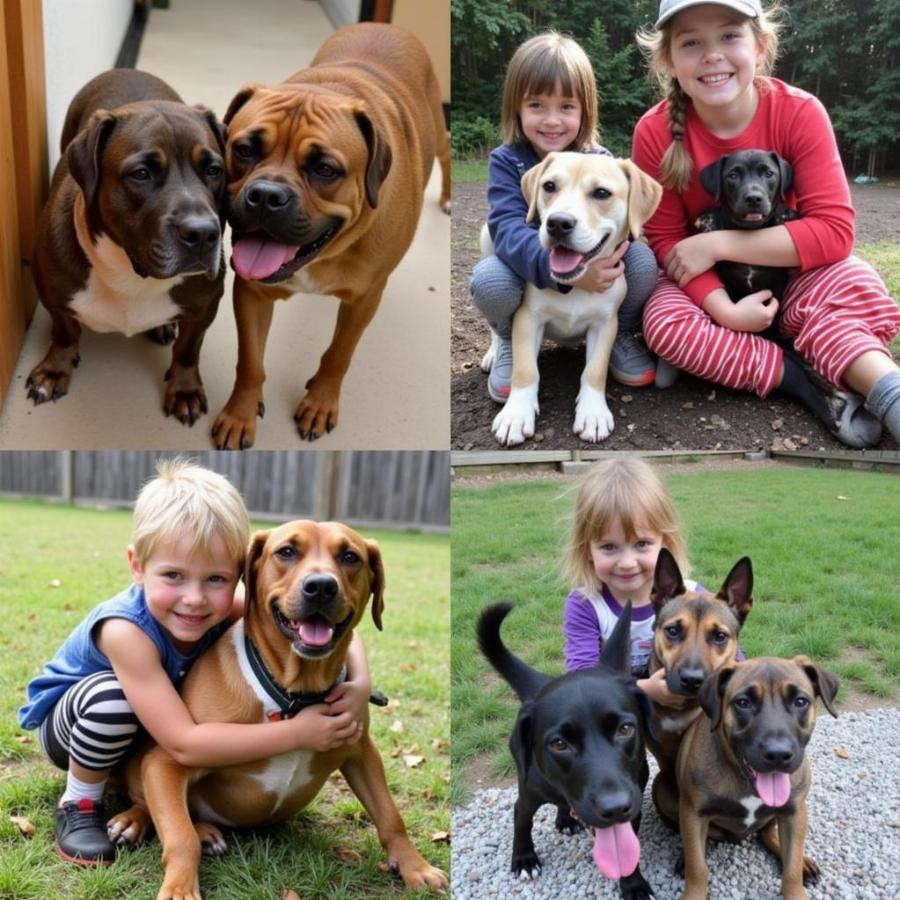The term “scary dog breeds” often conjures images of menacing canines, but the truth is far more nuanced. What makes a dog “scary” is often subjective, influenced by media portrayals, personal experiences, and even cultural biases. This article delves into the reality behind the label, exploring why certain breeds are deemed scary, addressing common misconceptions, and ultimately emphasizing responsible ownership as the key to a safe and happy relationship with any dog.
Understanding the “Scary” Label
Why are some breeds perceived as scary? Often, it boils down to physical attributes. Large size, muscular builds, powerful jaws, and a history of being bred for protection or guarding can contribute to a dog’s intimidating appearance. Breeds like Rottweilers, Doberman Pinschers, and American Bulldogs often fall into this category.
However, appearance isn’t everything. Media portrayals often perpetuate negative stereotypes, associating certain breeds with aggression. This can unfairly demonize these dogs and create fear in the public.
Debunking the Myths about Scary Dog Breeds
It’s crucial to remember that a dog’s behavior isn’t solely determined by its breed. While genetics play a role, upbringing, training, and socialization are equally, if not more, important. A well-socialized and trained Rottweiler can be a gentle giant, while a poorly socialized Chihuahua can be aggressive.
Are Big Scary Dog Breeds Inherently Dangerous?
No. While some large breeds possess the physical capability to inflict serious damage, this doesn’t equate to inherent danger. Responsible ownership, which includes proper training, socialization, and understanding the breed’s specific needs, is paramount.
Most Scary Dog Breeds: Fact or Fiction?
The idea of a definitively “most scary” breed is a misconception. Any dog, regardless of breed, can exhibit aggressive behavior if mistreated, neglected, or improperly trained. Focusing on responsible ownership is more effective than labeling entire breeds as dangerous.
 Chó cảnh đáng yêu
Chó cảnh đáng yêu
Responsible Ownership: The Key to a Safe and Happy Relationship
Regardless of breed, responsible ownership is the cornerstone of a positive human-canine bond. This includes:
- Early socialization: Exposing puppies to various sights, sounds, people, and other animals from a young age.
- Consistent training: Using positive reinforcement methods to teach basic obedience and address behavioral issues.
- Understanding breed-specific needs: Recognizing the unique characteristics and requirements of your chosen breed.
- Providing a safe and enriching environment: Ensuring your dog has a secure space, proper exercise, mental stimulation, and regular veterinary care.
Conclusion
While the term “scary dog breeds” persists, it’s important to look beyond superficial labels and focus on responsible ownership. By understanding the factors that contribute to a dog’s behavior and committing to proper training and socialization, we can create safe and harmonious relationships with dogs of all breeds. Remember, a dog’s behavior is a reflection of its upbringing, not just its breed.
FAQ
- Are certain breeds inherently more aggressive? No, breed is not the sole determinant of aggression. Environment, training, and socialization play crucial roles.
- How can I make my “scary” dog less intimidating to others? Focus on obedience training and socialization. A well-behaved dog is less likely to be perceived as a threat.
- What should I do if I encounter a dog I perceive as scary? Remain calm, avoid direct eye contact, and slowly back away. Do not run or make sudden movements.
- Are there legal restrictions on owning certain breeds? Yes, some areas have breed-specific legislation (BSL). Research local laws before acquiring a dog.
- How can I choose the right dog for my family, even if I’m concerned about certain breeds? Research different breeds, consider your lifestyle and experience, and consult with reputable breeders or rescue organizations.
Do you have other questions about dog breeds? Check out these related articles:
Beaut Dogs is your trusted source for comprehensive information on the world of dog breeds. We offer expert advice on everything from breed selection to responsible ownership, ensuring a happy and healthy relationship between you and your canine companion. When you need support, contact us via Email: [email protected] to get detailed and accurate answers from Beaut Dogs. Visit us at https://beautdogs.com.